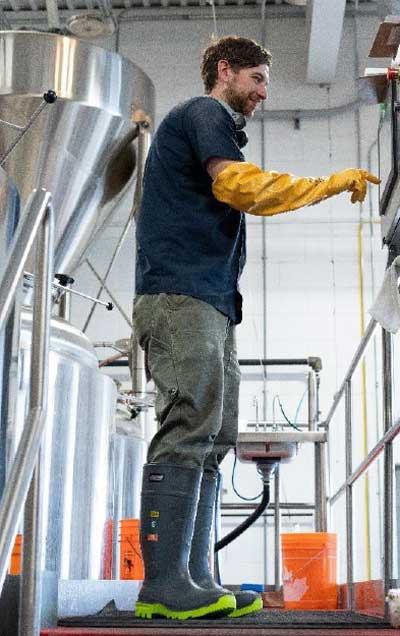Sanitation is an essential step for any food manufacturing plant. Proper sanitation ensures that food is processed on clean machinery, reducing or eliminating the risk of microbe, pest and allergen-related issues.
We simply could not have a safe food system without individuals working on the front lines and keeping plants clean.
You could even argue that the sanitation department is one of the most important departments at any food facility.
How can you expect to do anything if nothing is clean? To keep things clean, manufacturing facilities, hire sanitation workers because they maintain good housekeeping and sanitary conditions within a facility.
Sanitation workers sanitize and clean processing areas
A sanitation worker keeps manufacturing plants, including its equipment and machinery, clean on a regular and scheduled basis in accordance with government regulations, the public health code and generally accepted food industry sanitation standards.

Sanitation workers complete the responsibilities of the sanitation department by working as a part of a sanitation team. They use appropriate cleaning methods (in accordance to Good Manufacturing Standards) to clean all equipment and utensils (i.e., pails, containers, machine parts). Other fixtures sanitation workers may be required to clean are roofs, fans, ceilings, walls and floors.
Throughout the cleaning process, sanitation workers complete forms as set out by the sanitation and quality departments. These forms keep track of sanitation procedures and show proof that equipment has been cleaned should an audit occur.
Finally, they clean and sanitize production equipment based on a master cleaning schedule. Schedules provide workers with information of what tasks are to be performed on their shift.
Sanitation workers work in teams
The number of individuals that a sanitation worker works with varies, depending on the size of the company. Many sanitation workers work independently and are assigned specific tasks to complete by the end of the shift. However, sometimes these professionals might be required to work as a team such as when they have to clean a large piece of machinery.
Throughout cleaning, workers need to be aware of colleagues and how they clean because it avoids cross-contamination. For example, you wouldn’t want to clean an allergen surface beside a non-allergen surface or use the same water. Not knowing what your co-workers are doing could lead to a food safety risk.
Sanitation workers don’t need a post-secondary education
The best part about this job is that typically no previous experience or education is required. Facilities will provide you with on the job training. Training sometimes comes in the form of formal training, but you will learn the most from colleagues and supervisors.
It is a good occupation which gives you the option to enter with no formal education and the opportunity to work your way up the ranks and pay grades. You could start off as a sanitation worker, work your way up to a sanitation lead and in some cases even begin to work in the quality or production departments.
Sanitation workers work in a mixture of working conditions
Manufacturing plants vary in the setup of their facilities. Some facilities are cold, some on the more humid side, while others are just at room temperature.
Sanitation workers must be prepared to work in different conditions as required by the employer. It’s important to note that each plant differs in their structure and sanitation conditions. Nowadays, a newer plant is pristine and often highly automated. Therefore, the environment is very high-tech.
Sanitation workers have very physical jobs
Sanitation workers spend nearly all their time on their feet, moving constantly. Throughout the day, they are required to stand or stoop for the full shift and in many cases, to climb ladders.
Good mobility is also required because they must reach high to clean things such as roofs, fans, ceilings and walls using specific procedures as directed.
Not only that, but depending on the size of the equipment, they may have to control high-pressure hoses. Furthermore, these workers move equipment to different parts of the plant and lift heavy chemicals. This is very physically demanding work.
Sanitation workers understand MSDS
Sanitation workers come across a variety of chemicals throughout their day and it is integral for their own safety that they know what they are using. To obtain information on chemicals, they look to a Material Safety Data Sheet (MSDS) – a document that contains information on the potential hazards (health, fire, reactivity and environmental) and of a chemical product.
Therefore, it is important that sanitation workers have a basic level of writing and reading comprehension. These workers must understand what each chemical does and how to properly use them.
Sanitation workers keep track of what they do
Documentation isn’t considered fun to do, but it is a requirement of the job. Sanitation workers keep track of what they are doing by completing forms, marking check boxes and recording numerical information. Documentation acts as a facility’s proof of cleaning. When an audit comes up, their records prove they have cleaned the machinery.
Other basic writing tasks a sanitation work might perform include writing short notes to supervisors requesting supplies and a brief description or report on a corrective action.
Sanitation workers have a good memory, make decisions and plan tasks
Being a sanitation professional requires a range of skills. However, there are a few which are more essential than others. These skills include:
- Good memory – Although sanitation workers have written Standard Operating Procedures (SOP), these take time to read every day. Over time, sanitation workers develop a good working memory by watching other people perform. Having a good memory ensures faster times and better muscle memory as well.
- Task planning and organizing – Sanitation workers need to be flexible and prepared at any time for their required tasks to change. For example, an unexpected order might come in for a plant that requests them to clean a machine immediately. They have a good understanding of how long each task will take so they can better organize their day.
- Decision-making – Many sanitation workers work independently. Therefore, they must have the ability to make decisions such as when it is the best time to perform a task, use appropriate equipment and efficiently deal with a problem.



